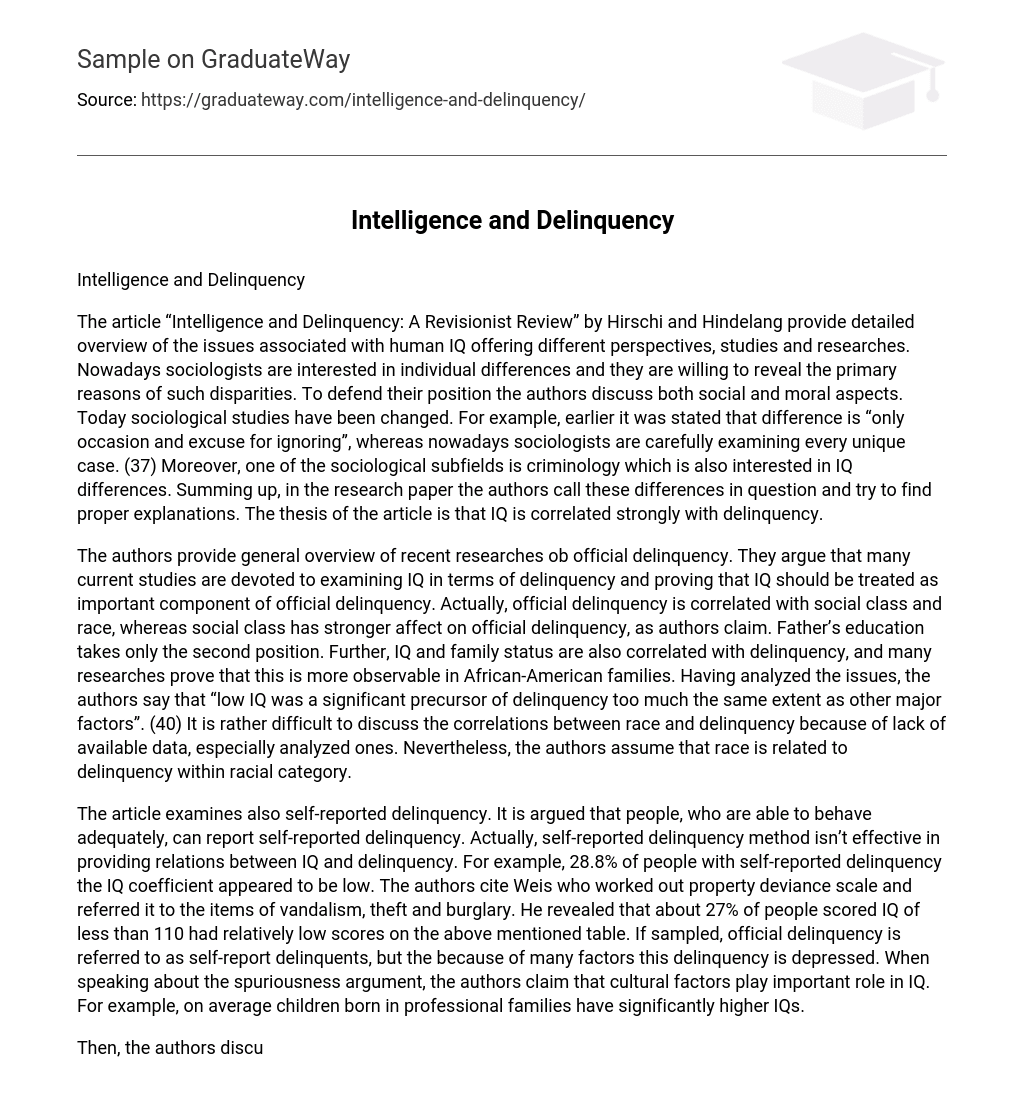The article “Intelligence and Delinquency: A Revisionist Review” by Hirschi and Hindelang provide detailed overview of the issues associated with human IQ offering different perspectives, studies and researches. Nowadays sociologists are interested in individual differences and they are willing to reveal the primary reasons of such disparities. To defend their position the authors discuss both social and moral aspects. Today sociological studies have been changed. For example, earlier it was stated that difference is “only occasion and excuse for ignoring”, whereas nowadays sociologists are carefully examining every unique case. (37) Moreover, one of the sociological subfields is criminology which is also interested in IQ differences. Summing up, in the research paper the authors call these differences in question and try to find proper explanations. The thesis of the article is that IQ is correlated strongly with delinquency.
The authors provide general overview of recent researches ob official delinquency. They argue that many current studies are devoted to examining IQ in terms of delinquency and proving that IQ should be treated as important component of official delinquency. Actually, official delinquency is correlated with social class and race, whereas social class has stronger affect on official delinquency, as authors claim. Father’s education takes only the second position. Further, IQ and family status are also correlated with delinquency, and many researches prove that this is more observable in African-American families. Having analyzed the issues, the authors say that “low IQ was a significant precursor of delinquency too much the same extent as other major factors”. (40) It is rather difficult to discuss the correlations between race and delinquency because of lack of available data, especially analyzed ones. Nevertheless, the authors assume that race is related to delinquency within racial category.
The article examines also self-reported delinquency. It is argued that people, who are able to behave adequately, can report self-reported delinquency. Actually, self-reported delinquency method isn’t effective in providing relations between IQ and delinquency. For example, 28.8% of people with self-reported delinquency the IQ coefficient appeared to be low. The authors cite Weis who worked out property deviance scale and referred it to the items of vandalism, theft and burglary. He revealed that about 27% of people scored IQ of less than 110 had relatively low scores on the above mentioned table. If sampled, official delinquency is referred to as self-report delinquents, but the because of many factors this delinquency is depressed. When speaking about the spuriousness argument, the authors claim that cultural factors play important role in IQ. For example, on average children born in professional families have significantly higher IQs.
Then, the authors discuss measures of delinquency, in particular detection and differential hypothesis and they pay thorough attention to the meaning of IQ. Firstly, they discuss the cultural bias of IQ tests arguing that bias hypothesis doesn’t adequately show the real picture of the argument or, in other words, this hypothesis is plausible. Therefore, on this basis it is practically impossible to explain individual differences between delinquents and non-delinquents if to consider individuals within one race. Furthermore, scores of IQ tests are considered unstable and such as are subjected to social influences. For example, the author assume that “low IQ child today may be the high IQ child tomorrow” and otherwise. (49) It means that scores can change with time.
In conclusion, the authors sum up main arguments and evidence to illustrate that IQ is likely to affect delinquent behavior. After all researches, it is found out that non-delinquents have significantly higher IQs compared with that of delinquents’. Modern theories support the idea that IQ and delinquency are correlated. Nevertheless, these are only assumptions and no direct evidence exists to prove that IQ affects delinquency rates.
References
Hirschi, T., & Hindelang, M. Intelligence and Delinquency: A Revisionist Review. Chapter III from Psychological/Psychiatric theories of Crime, pp. 37-49.





